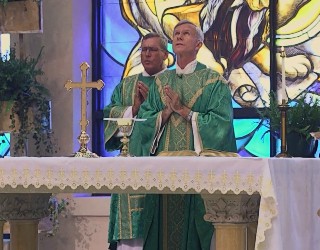Celebrate Sunday Mass with Bishop Strickland - 9.6.20
Join Bishop Strickland for the live Mass.
The Mass in both English Spanish are available below.
9/6/2020 (5 years ago)
By Deacon Keith Fournier
English:Spanish:
Dear Catholic Online Community and Catholic Online School students...
I AM HAPPY TO OFFER EACH OF YOU AN INVITATION TO SUNDAY MASS WITH BISHOP JOSEPH STRICKLAND ON THE TWENTIETH SUNDAY IN ORDINARY TIME.
I know you look forward to hearing Bishop Strickland preach. The response to offering these beautiful liturgies has been overwhelming. I also know that, like me, you are drawn closer to the Lord when he offers the Holy Sacrifice of the Mass. The readings, as always, offer so much for us to reflect on. It is helpful to pray through them and reflect upon them.
In our first reading, we hear that the Prophet Ezekiel is appointed by the Lord to be a "Watchman", a sentinel, for the House of Israel. The Lord will give His word to the Prophet and he is to deliver it to the people of God. As a Prophet, he is to warn them of the consequences of their disobedience and to call them to repentance in order that they may return to the Lord.
This prophetic task is now the task of the leaders of the Catholic Church. They are responsible, as was Ezekiel, to guard the full deposit of faith, to address the reality of sin and to call people to repent of it and return to the Lord. That requires them to be fully living the faith and practicing the very words they proclaim. How are they doing?
In the excerpt from Saint Paul's letter to the Romans, in our second reading, the Apostle Paul continues the theme, explaining the role of Church leaders. He, as an apostle, is called to teach the members of the Church to love one another, as Jesus Christ loves us.
Loving your neighbor as yourself sums up the whole of the Law and the Prophets. In Chapter twelve, the chapter before what we hear this Sunday, he gave them - and gives us - a rich teaching on the New Life in Jesus Christ and the marks of the true Christian. Love sums them all up.
Jesus made this all very clear in these words from the 34th and 35th verses of the 13th Chapter of the Gospel of St John "A new commandment] I give to you, that you love one another; even as I have loved you, that you also love one another. By this all men will know that you are my disciples, if you have love for one another." How are we doing?
The Gospel for Sunday's Holy Mass is taken from Chapter 18 of St Matthew. In the first part of that chapter, Jesus called a child to Himself to answer the disciples' question as to who is the "greatest" in the kingdom. In this passage, Jesus calls all of us to an ever-deepening holiness of life, precisely because we are His disciples. That holiness calls us to live differently, with one another.
He is calling us to be reconcilers, eager to resolve our disputes with integrity. In fact, this passage, and others like it, formed the foundation for what became the Canon Law of the Church. Some translations say, "report it to the community". A more accurate translation is "tell it to the church". The Church is the place where we are called to reconcile with one another.
The early Christians did not bring one another to Civil Courts. They lived a new way, wherein they would seek to resolve disputes with one another right within the Church. Do we live that way? How do we view the Church and our place within it as members of the Mystical Body of Jesus Christ? Do we understand Christianity to be a new way of living?
And, notice in the Gospel, the emphasis is always on fraternal correction in the Church. The goal of all such correction is to help to save a brother or sister who has strayed. The last part of this instruction on how to deal with a brother or sister who has committed an act of wrongdoing is to place them outside of the Church. That was what "treating them like a tax collector or gentile" meant. It referred to excommunication, placing them outside of communion until they repented. Even excommunication that was understood as remedial, intended to lead that brother or sister to repentance and reconciliation. The Catholic Catechism explains in paragraph 1445:
"The words bind and loose mean: whomever you exclude from your communion, will be excluded from communion with God; whomever you receive anew into your communion, God will welcome back into his. Reconciliation with the Church is inseparable from reconciliation with God."
How do we deal with wayward brothers and sisters?
May the Lord bless you, your families, the Church, and the Nations of the world on this Lord's Day.
Deacon Keith Fournier
Dean of Catholic Online School
Chaplain of Your Catholic Voice Foundation
Copyright 2026 Catholic Online.

